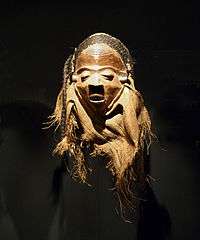Pende people
|
Pende mask in the Ethnological Museum of Berlin | |
| Total population | |
|---|---|
| c.250,000 | |
| Regions with significant populations | |
|
| |
| Languages | |
| Kipende |
The Pende people (singular: Mupende; plural: Bapende), also known as the Phende people, are an ethnic group in the south-western Democratic Republic of the Congo. The Pende are divided into two cultural groups: the Eastern Pende and the Western Pende who are distinct but consider themselves part of the same ethnic group. The number of people who consider themselves to be ethnically Pende is estimated at over 250,000.[1]
The Pende speak their own language (Kipende) and are particularly known for their artistic works. They are considered to be culturally similar to the Yaka and Suku peoples who live in neighboring areas.[1]
History
The Pende are divided into two distinct cultural groups: the Western Pende and the Eastern Pende.[1] However, both groups see themselves as part of the same ethnic group.[1] There is no centralised political authority and Pende society is organised around extended family groups rather than through chiefly authority.[1]
Much like the Yaka and Suku peoples, the Pende originally lived in the strip between the Atlantic Ocean and the Cuanza River, in modern-day Angola. They migrated to their current region of the modern-day Democratic Republic of the Congo in around 1620 as a consequence of the expansion of the Kingdom of Lunda.[1] In around 1885, the powerful Chokwe ethnic group began expanding and gained control over the Eastern Pende but this period was brought to an end by the arrival of European colonists and the creation of the Congo Free State.[1]
Between May and September 1931, the Pende revolted against Belgian colonial rule in Kwilu, killing a colonial tax collector. The revolt was quickly suppressed by the colonial authorities but was one of the largest revolts in the Congo during the Interwar.[2]
Culture
The Pende have a matrilineal culture and family kinship plays an important role in structuring social relations.[1] They traditionally practice a form of ancestor worship in which the ancestors (Mvumbi) are believed to affect prospects of success and failure in everyday life.[1]
The Pende traditionally speak their own language, known as Kipende, which is part of the Central Bantu group.[1] The Pende are particularly known for their art, which is complex and includes traditional masks, associated with initiation rituals.[1]
References
External links
![]() Media related to Bapende people at Wikimedia Commons
Media related to Bapende people at Wikimedia Commons
- A Rising of the Wind: Art from a Time of Rebellion in the Congo by Richard B. Woodward (Virginia Museum of Fine Arts)
